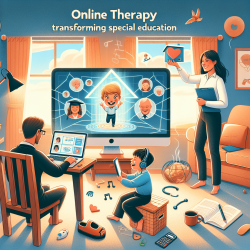Caring for children with intellectual disabilities (ID) presents unique challenges and opportunities for healthcare practitioners. A recent study titled "Healthcare utilisation and unmet health needs in children with intellectual disability: a propensity score matching approach using longitudinal cohort data" provides valuable insights into the healthcare utilization patterns and unmet needs of this vulnerable population. This blog post aims to help practitioners enhance their skills by implementing the outcomes of this research or encouraging further exploration.
The Study at a Glance
The study, conducted by Nicholson et al., utilized data from the Growing Up in Ireland study to compare healthcare utilization and unmet health needs between children with ID and those without. The researchers employed a propensity score matching (PSM) approach to create a control group that closely matched the ID group on variables influencing healthcare utilization. This method allowed them to estimate differences between the two groups more accurately.
Key Findings
- Children with ID were not more likely to visit a general practitioner (GP) or emergency department (ED) than their peers without ID.
- However, they were more likely to visit a doctor in a hospital setting and have an overnight stay by age 9.
- Primary caregivers of children with ID reported higher levels of unmet health needs at ages 9 and 13.
Practical Implications for Practitioners
The findings of this study highlight several areas where healthcare practitioners can focus their efforts to improve care for children with ID:
1. Enhance Hospital-Based Care
The increased likelihood of hospital visits among children with ID suggests a need for enhanced hospital-based care. Practitioners can work on developing specialized protocols and training programs to better address the unique needs of these children during hospital visits.
2. Address Unmet Health Needs
The higher reports of unmet health needs among caregivers indicate a gap in current healthcare services. Practitioners should strive to identify these gaps through regular communication with caregivers and develop strategies to ensure comprehensive care delivery.
3. Leverage Propensity Score Matching in Research
The use of PSM in this study demonstrates its effectiveness in reducing confounding variables and providing clearer insights into healthcare disparities. Practitioners involved in research should consider using PSM to enhance the validity of their studies, particularly when dealing with complex populations like those with ID.
Encouraging Further Research
This study opens several avenues for further research that can contribute to improving healthcare outcomes for children with ID:
- Longitudinal Studies: Conducting longitudinal studies beyond the ages of 9 and 13 can provide insights into how healthcare needs evolve as children with ID grow older.
- Intervention Studies: Developing and testing interventions aimed at reducing hospital visits or addressing unmet health needs could lead to significant improvements in care.
- Cross-Cultural Comparisons: Comparing healthcare utilization patterns across different countries or regions can help identify best practices that can be adopted globally.
By understanding these findings and implementing changes based on this research, practitioners can significantly improve the quality of care provided to children with intellectual disabilities.
To read the original research paper, please follow this link: Healthcare utilisation and unmet health needs in children with intellectual disability: a propensity score matching approach using longitudinal cohort data.










